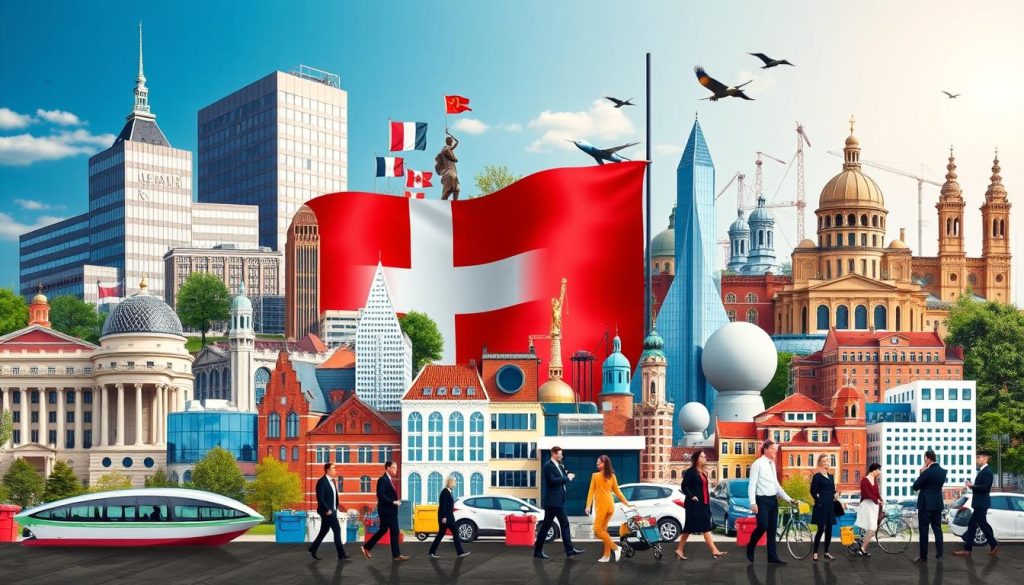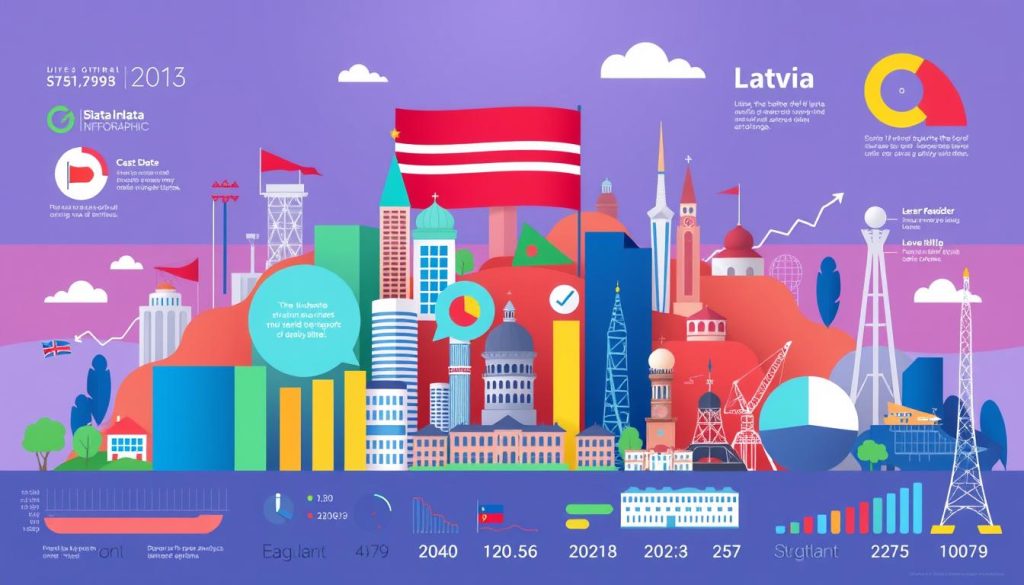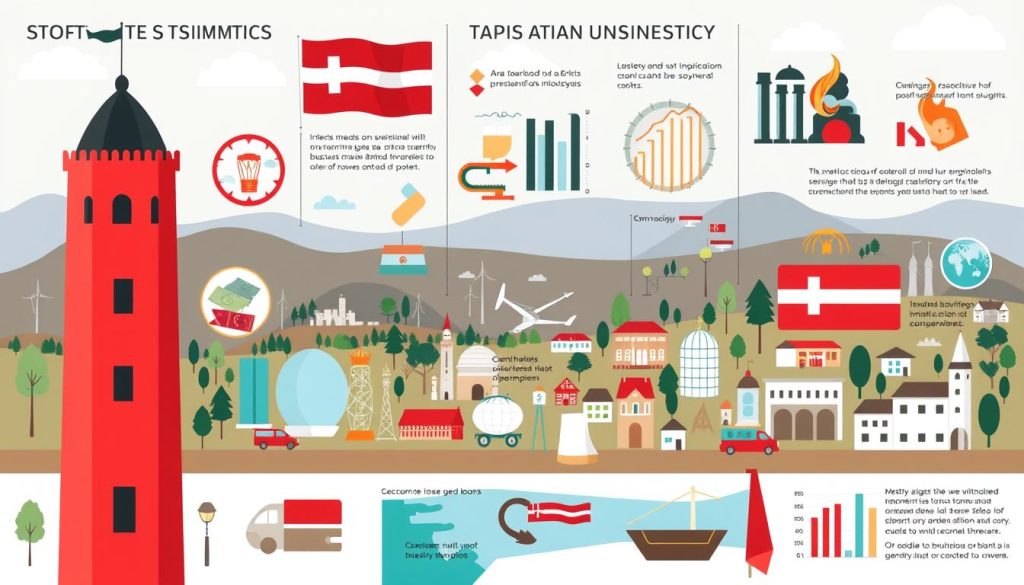When we look into the Latvia economy, we see how crucial structural business statistics (SBS) are. They help us understand how businesses work and perform. These statistics give us detailed data on various economic activities in Latvia and the EU.
They are key for policymakers and analysts. They help us make smart choices about business policies and see how they affect the economy.
Thanks to economic analysis through SBS, we can deeply understand Latvia’s business world. We can look at data by NACE sector and enterprise size. This gives us a clear view of how small and medium-sized enterprises (SMEs) help our economy.
This detailed data helps us understand today’s economy and plan for the future. It guides our decisions and helps us shape our economic policies.
Overview of Structural Business Statistics
Understanding structural business statistics (SBS) is key to grasping its role in economic analysis. SBS offers detailed data on business activities in an economy. It helps in making decisions about the business sector, showing how policies affect it and the ups and downs in business cycles.
Definition and Purpose
The definition of SBS covers important details about the business environment’s structure and performance. It does more than just collect data; it gives insights into economic trends and activities. Policymakers use SBS to track key performance indicators, helping them develop strategies for economic growth and supporting small and medium-sized enterprises (SMEs).
Importance for Policymakers and Analysts
The role of SBS for policymakers and analysts is crucial. It helps spot emerging economic trends that need attention and action. With accurate data, policymakers can shape their strategies to support different sectors, ensuring their efforts match the current business economy. Analysts get a clearer view of market conditions, enhancing their forecasting abilities and understanding of economic challenges.
Understanding the Business Economy in Latvia
The Latvian business economy is made up of many sectors. These sectors work together to shape the country’s economy. The main sectors include industry, construction, distributive trade, and services. Each plays a big role in how the economy grows and operates.
Components of the Business Economy
Several key parts make up the Latvian business economy. These are:
- Industry: It makes up 21.6% of GDP and employs nearly a quarter of the workforce. This shows its importance to the economy.
- Construction: It offers many jobs and is key for building infrastructure.
- Distributive Trade: This includes motor trade and retail. It accounts for about 18.1% of all businesses.
- Services: It’s the biggest part, making up 61.7% of GDP. It also employs about 70% of the active population.
Key Sectors and Their Contributions
It’s important to know about the key sectors in Latvia. The services sector is especially big, providing most jobs and adding value. In 2023, Latvia’s economy is expected to start growing again, with a 1.7% increase in 2024.
The services sector is key to this positive outlook. The agricultural sector also plays a role, even though it only makes up 5% of GDP. It employs 7% of the workforce and helps balance the economy.

Structural Business Statistics in Latvia
SBS data in Latvia gives us a detailed look at the country’s economy. It focuses on the non-financial business sector. This data helps us understand different sectors and their performance.
It shows how businesses are doing, divided into micro, small, medium, and large enterprises. This helps us see the whole picture of our economy.
Availability and Level of Detail
The SBS data is very detailed, helping us study the Latvian economy. It’s useful for policymakers, analysts, and researchers. They can see how businesses grow and work.
The data is rich and detailed. It helps us spot trends, patterns, and oddities in Latvia’s business world.
Analysis by Enterprise Size Class
Enterprise size classes are key to understanding our business world. About 99.8% of businesses in Latvia are small and medium-sized. They play a big role in our economy.
These businesses are crucial for jobs, innovation, and keeping the economy strong. They make up a big part of GDP and create many jobs. So, it’s important to know how they work through detailed statistics.

Sectoral Analysis: Employment and Value Added
In Latvia, we see how different sectors shape the labour market. Each industry plays a key role in employment levels and economic growth. Our study shows how these sectors work together to create a strong economy.
Contribution of Different Sectors to Employment
The service sector is the biggest employer in Latvia. Construction and distributive trades also have a big impact. This diversity shows how various industries are connected.
Each sector not only supports its workers but also helps the economy grow. They create jobs and improve skills.
Value Added Generated by Key Industries
The value added by sector changes a lot between industries. Manufacturing is a big contributor to Latvia’s economy. It added around €2,420 billion to the economy.
Other sectors, like ICT, also grew a lot. They created more jobs and helped the economy even more.
The Role of Small and Medium-Sized Enterprises (SMEs)
Small and Medium-Sized Enterprises (SMEs) are vital in Latvia’s economy. They make up about 99.8% of all businesses. This shows how important they are for jobs and growth.
These businesses employ a big part of the workforce, 63.4% to be exact. They are not just job creators. They also drive innovation and help local areas grow.
Prevalence and Representation of SMEs
SMEs do more than just fill numbers. They are key in making the economy grow. They adapt to market needs and encourage new businesses.
They work in many sectors, making the economy stronger. This helps them serve both local and global markets. Their quick response to changes makes them crucial for the economy.
Impact of SMEs on Economic Performance
SMEs are crucial for Latvia’s economy. They add about 50.2% of the value to the economy. This shows their big role in keeping the economy healthy.
As they grow, with the right support, they will help Latvia’s economy become stronger and more vibrant.

